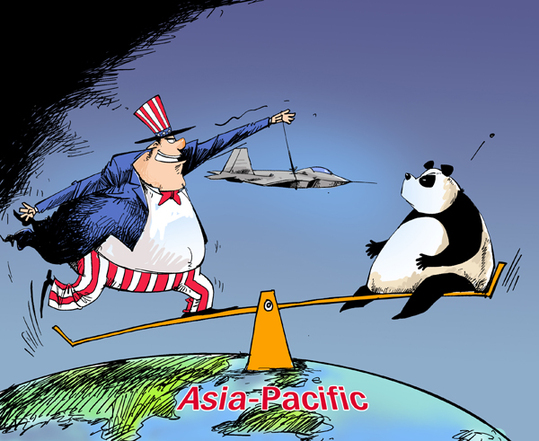China - a positive force in international issues
- By Su Xiaohui
 0 Comment(s)
0 Comment(s) Print
Print E-mail People's Daily Online, September 18, 2013
E-mail People's Daily Online, September 18, 2013
China's Foreign Ministry released the Position Paper of China at the 68th Session of the United Nations General Assembly on September 9. In this paper China explains its position on international issues, including the Syrian crisis and information and network security. China also proposes the formulation of a post-2015 development agenda which addresses the common interests of all mankind. The paper reflects China's determination to support the United Nations and to play an appropriate role in promoting a more just and equitable international order.
|
|
|
Striking an imbalance [By Gou Ben/China.org.cn] |
Regarding the alleged use of chemical weapons in Syria, China advocates adopting a responsible attitude to solve the crisis.
China does not take sides with any party, and will not help to conceal the evidence of wrongdoings. In fact, China has always taken a firm stand on the prohibition of chemical weapons and played a prominent role in the relevant multilateral process.
Early in 1980 when China became involved in multilateral disarmament negotiations for the first time, China participated in the negotiations leading to the United Nations Chemical Weapons Convention. During this process, it was China that required the incorporation of a prohibition on chemical weapons into the convention, and later made unremitting efforts to ensure that the proposal was accepted by all countries.
China's position on Syria is that any further action should be taken on the basis of the results released by UN investigation team and should be decided by the UN Security Council. There should be no unilateral military action against Syria.
Only in this way, China believes, can the world avoid a headlong rush into Western "neo-interventionism", and regional or even world chaos. At this moment Syria can see the faint prospects of a new window of opportunity - a political solution to the crisis - and the parties involved should embrace that opportunity.
Following the revelations about Washington's PRISM spy program, many countries began to re-examine the challenges presented by the need for information and network security. The United States, holding an advantage in network information technology, has been carrying out large-scale monitoring of its own people and other countries. At the same time it has made groundless accusations of "hacker" attacks against other countries.
In this context, China's position paper also emphasizes that China stands for incremental achievement of fair and democratic governance of the Internet; China opposes cyber war, opposes cyber arms races, and opposes the use of cyberspace to interfere in other countries‘ internal affairs.
However, in order to maintain its superiority in this area of information technology, the United States has deliberately ignored calls for an International Code of Conduct for Information Security, as proposed by China and Russia. In response, China is continuing to encourage other countries to bring to a successful conclusion their efforts to formulate a code, and to support a leading role for the U.N. in addressing issues related to cyber security.
At present, the world economy is seeing a weak recovery, and issues relating to development are being followed very closely around the world, particularly by developing countries. Given that the Millennium Development Goals, the guide for international development and cooperation, will be due in 2015, the proposals concerning objectives and basic principles for the post-2015 development agenda contained in China's position paper will have a constructive role to play.
China is now assuming an increasingly important role in the UN's leading multilateral mechanisms. China adheres to the maintenance of world peace and security to promote human development and progress, and to identify solutions to global issues and challenges. In multilateral affairs, China's stance is an increasingly constructive one.
The author is Su Xiaohui, Deputy Director of International and Strategic Studies from the China Institute of International Studies.







Go to Forum >>0 Comment(s)